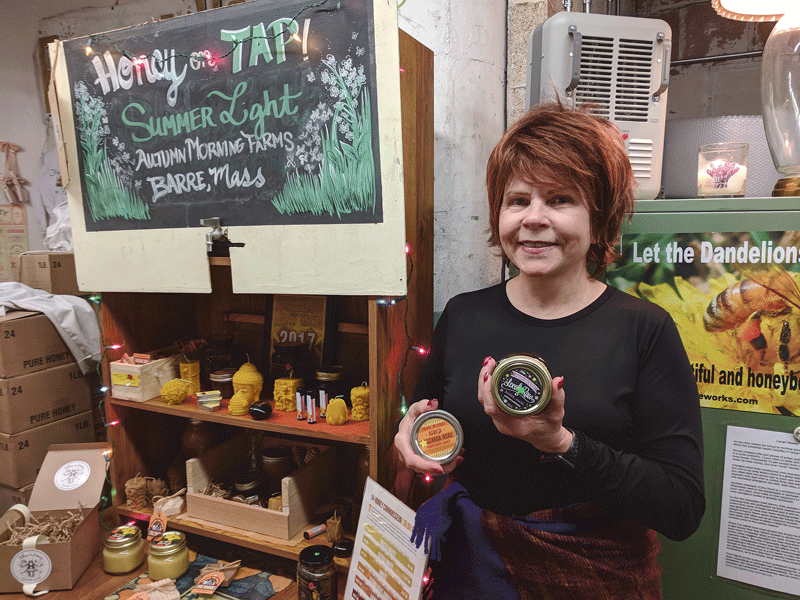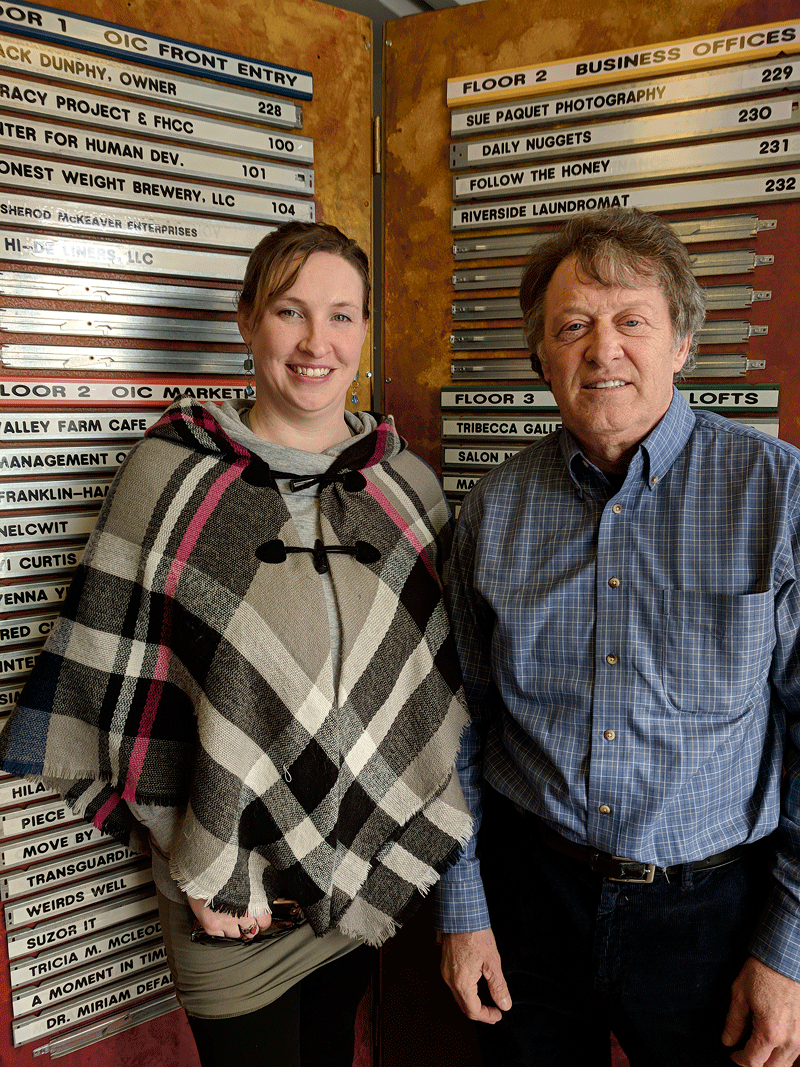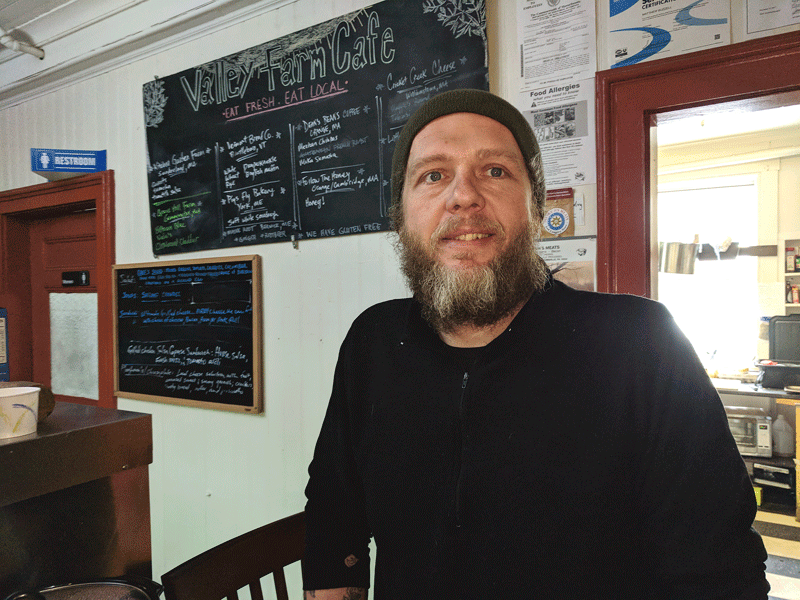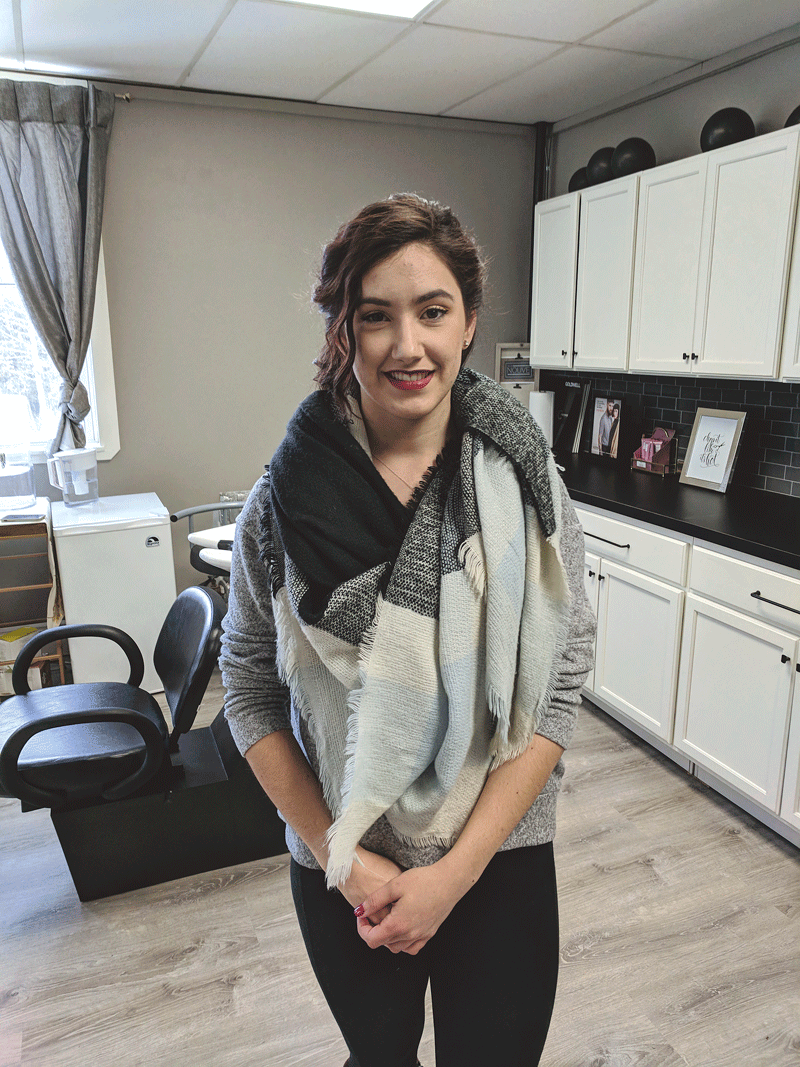Businesses Connect and Grow at the Orange Innovation Center
Hive of Activity

Mary Winzer Canning, owner of Follow the Honey.
The movement toward innovation centers and collaborative maker spaces might be hot right now across Western Mass., but the Orange Innovation Center was on the cutting edge when it opened 20 years ago in this small Franklin County town. Under its current ownership, the complex has doubled its tenant roster over the past five years, in turn boosting perhaps its greatest calling card — the built-in support of a business community invested in seeing each other succeed.
Mary Winzer Canning characterizes her business, Follow the Honey, as a “human-rights honey company” that creates products with honey sourced from beekeepers and small-batch producers around the world. So she knows a little something about bees — and their habitats.
“No bee in isolation is effective because it operates as a superorganism,” she explained. “It’s about what’s best for the whole.”
The same can be said for the Orange Innovation Center (OIC) and the 48 businesses that call the complex — nestled in the woods in this Franklin County town of 4,500 residents — home.
“It’s a hive,” Winzer Canning said. “There’s a sense of egalitarianism here, where everyone is really rolling together. We want this to be a place where people are not in their silos. It’s the whole idea of having an open hive where everyone can learn from each other and help each other. It’s about giving; it’s about problem solving.”
And it’s about community, tenants repeatedly pointed out when BusinessWest spent the better part of a morning at the complex recently.
“I love that fact that I get to pamper the people with businesses here in the community, just building those bonds and really cross-advertising each other,” said Danalynn Stockwood, who owns the Fun Fancy Nails salon, just a quick walk down the hall from other personal-care businesses.
“I tell my customers, ‘hey, if you need your hair done or colored, we have a little salon right around the corner, and if you need a facial or waxing, go down the hall,’ and it’s just nice to have that support amongst each other,” she said. “We’re always saying, ‘hey, have you tried the Valley Farm Café?’ or ‘have you tried the gym?’ and ‘have you seen the honey?’ It’s just such a great family.”
Then-building owner Noel Vincent launched the Orange Innovation Center as a mixed-use destination 20 years ago, but occupancy really began to soar under its current owner, Jack Dunphy, who bought the complex in 2013 and has increased its tenant roster from 26 to 48.
“The mill owners had just left these abandoned buildings in the post-industrial era, so Noel started converting it into offices and multi-purpose suites,” said Brianna Drohen, the center’s development director. “He was actually a visionary; this is one of the first innovation centers in the state, if not the country.”
When Dunphy, who also owns Dunphy Real Estate, purchased the property, about 75,000 of its 128,000 square feet were rented, and he saw plenty of potential in the rest — but, more than that, an investment he could truly enjoy.

Brianna Drohen and Jack Dunphy have seen tenancy surge to nearly 50 businesses at the Orange Innovation Center.
“I met some of the tenants and saw a real sparkle in their eye and realized this could be fun,” he recalled. “And if you can do something fun and maybe make a little money along the way, that’s an exciting business venture — and it has been.”
The tenants, several of whom were enthusiastic about speaking with BusinessWest, range from a clinical psychologist to a photographer; from a career-services center to the Literacy Project, and even the Center for Human Development, which houses a branch on the ground floor.
“The kinds of businesses we concentrate on tend to be in the service industries, so they’re bringing in foot traffic — a brewery, a nail salon, a hair salon, a gym, a massage therapist, and there are also lot of professional offices. There’s a really healthy mix of businesses. And we’re strategic about who we let in here,” Drohen said, noting that she and Dunphy don’t allow competing businesses unless an existing tenant doesn’t mind.
“It’s about revenue,” she went on, “but at the end of the day, it’s more about growing this business community and having all the businesses be able to work with each other and sustain each other and support each other in any way they can.”
They certainly do, and in many ways, as we were quick to discover.
Food for Thought
Matt Buzzell has been in the food-service industry for almost a quarter-century, working in establishments in New York, New Jersey, and New Hampshire. He said he wouldn’t have recognized the potential of the OIC, where he opened Valley Farm Café in July, just by looking at the understated old mill.
“Driving by, you have no idea what’s going on. But this place has a heartbeat — there’s a pulse when you walk in the doors and look around and see these businesses … it’s very energizing.”
He was introduced to the center by Jay Sullivan and Sean Nolan, the proprietors of Honest Weight Artisan Beer, who gave him their spent grain to feed the hogs on his nearby farm. “I found out through them that this opportunity was going to come up — the previous café owner didn’t want to do it anymore — so, long story short, I got together with Bri, had a meeting, and proposed a business plan.”
It turned out to be a successful one; the enterprise — which serves up salads, sandwiches, Tex-Mex fare, smoothies, and more, with ingredients sourced from local farms — draws a long line during the lunch rush, and virtually everyone who spoke with BusinessWest mentioned the café, not just for the food, but for its role as a nexus for making connections and hanging out with other business owners.
“I believe in the economic-development renaissance going on in the area, and that’s what was attractive about coming here,” Buzzell said. “I’m very thankful for the reception I’ve received from the tenants, the sense of community — the support from them is very humbling.”
Carly Mongeau has worked in the hair-salon business all her professional life, mostly in the Worcester and Marlborough areas, but once she settled in Petersham, she fell in love with the Franklin County culture. She stumbled upon the Orange Innovation Center two years ago, and the timing wasn’t right, but when she took a second look last year, she couldn’t stop thinking about the potential. One of the newer tenants, she opened Salon Nouve in January.
“It’s a great opportunity for someone who’s starting a new business to have space versus having to find a whole building — it’s a little more affordable, and a great way to get started,” she explained.
That’s partly because the tenants, especially those in similar fields, not only patronize each other, but also create a one-stop shop of sorts, which they all benefit from.
“Around the corner is a nail salon and a skin-care business, so we’re a good trio,” Mongeau explained, noting that her last client that day, a business owner in Athol, had told her she couldn’t regularly get her nails and hair done if she didn’t have a place to schedule everything at once.
Meanwhile, she added, a handful of women business owners at the OIC meet regularly for lunch. “We all brainstorm and bounce ideas off each other. We’re all different businesses, but we all have common ground in one way or another.”
She also appreciates the way different business owners talk each other up to customers.
“I recommend people to Matt all the time, and Matt recommends people to me. They smell the food as they’re walking up and say, ‘that smells amazing,’ and I say, ‘you have to go check out Matt.’ Or, ‘now that you’re all beautiful, you’ll have to go stop and get a drink at Honest Weight.’ It’s a great one-stop shop, and that’s what most of my clients love — that they can come here and get everything taken care of in a very accessible way.”

Matt Buzzell has seen Valley Farm Café become a hub of sorts at the OIC, where small-business owners make connections over breakfast or lunch.
Phil Simon is one of the veteran tenants at the OIC, having headquartered his music booking and publicity company, Simon Says Booking, there for a dozen years. Meanwhile, his wife, Angel Simon, and her mother, Lynn England, operate Old 78 Clothing — which makes upcycled and refashioned music-festival wear — elsewhere in the building.
Simon, who previously lived in Oregon, ran his company — which represents about 20 bands doing up to 1,500 shows a year, in addition to representing venues and festivals — from Boston and then Greenfield before moving to Warwick and finding ideal office space in Orange.
“I was an early adopter; it was a matter of convenience for me,” he said, adding that he appreciates the balance between a quiet workspace and the ability to chat with other tenants when he wants to.
“Even though we have our privacy in our office, I could walk down and get something in the café, there’s a gym here, and we can interact with a variety of other local businesses and talk about the things we’re doing. We don’t have to be locked in our box all day long.”
Those neighbors aren’t just friends and sounding boards, however; they’re also resources. For example, he was able to locate a tow-behind generator, to be used at an event this summer, through another OIC tenant. “It’s not surprising; there’s quite a network going on here. We get people knocking on the door all the time.”
Launching an Idea
Like Simon, Alec MacLeod has been at the OIC for a long time; in fact, he was one of Vincent’s earliest tenants, running a wetlands and watershed consultancy. Today, he’s teaming up with Drohen on a project to turn 10,000 square feet in a currently unusable building in the complex into LaunchSpace, a ‘community workshop’ that will provide resources, equipment, training, and support to a broad spectrum of people.
To explain it, MacLeod broke down the endeavor into three tiers. First is a community-based set of shops with three rooms: an arts room for paper arts, fabric arts, pottery, etching, glass blowing, and photography; a large room entirely devoted to robotics and information technology; and a third room divided between metalworking and woodworking.
The second tier is an emphasis on workforce development and education, aimed at improving the employability and salary of members who may, for instance, learn how to operate CNC (computer numeric control) machinery, an important skill in manufacturing. MacLeod has reached out to both local manufacturers about what their workforce needs are, and the region’s colleges and universities about developing courses for the space.
The third tier is entrepreneurial support, he added. “If you would like to be a cabinetmaker or some other type of woodworker, for instance, but you don’t have $30,000 or the room at your own place to set up your own shop, you can buy an entrepreneurial membership here, month to month, and come use our equipment.”
He noted that members will also access storage, marketing services, help with writing a business plan, and the services of board members including two local credit-union representatives and the head of the North Quabbin Chamber of Commerce. As small businesses develop, they may incubate into spaces at the OIC or, better yet, need more space out in the community.

Carly Mongeau, who loves the Franklin County lifestyle, found in the OIC an ideal spot to grow Salon Nouve.
“This is economic development at the most basic,” MacLeod said. “This is grass-roots, town-scale economic development without needing to invite Apple to build a big factory.”
Drohen noted that Jay Ash, the state’s secretary of Housing and Economic Development, supported a recent $250,000 MassDevelopment Collaborative Workspace Initiative grant to improve the LaunchSpace site, because Ash is a believer in what’s happening in this corner of Franklin County.
“He sees how one business owner, Jack, can host all these businesses, and the state sees this whole collaborative workspace as the new way of doing business. This is where people can grow and can incubate and collaborate.”
Dunphy envisions LaunchSpace as the sort of environment where a middle-schooler might work alongside an 80-year old on woodworking equipment. “There will be interaction that normally doesn’t happen in a community, where different people who wouldn’t otherwise associate with each other are suddenly working together on a project.”
That also, in a way, describes the entire ecosystem at the Innovation Center.
“We’re all here earning our own livings,” MacLeod said, “but when we meet in the café, we have conversations, and we talk about what’s going on — ‘how is your business going? How are you doing? What are the hard parts?’ — and we help each other out. It’s a business community, and it really does foster innovation.”
Bee Ambitious
In a sense, innovation has been happening at the OIC since it housed Minute Tapioca in the early days of the 20th century. It was a multi-use complex in the middle of the century, hosting a sewing company, a shoemaker, and a retail store, among other businesses, before the Bedroom Company, a furniture manufacturer, set up shop in the 1960s.
Today, it’s back to multi-use, but the original tapioca vat is still in the basement, too expensive to remove. On the roof is a 93-kilowatt solar array, with plans to install another on the building that will house LaunchSpace.
That combination of old and new, historic and cutting-edge, isn’t unlike what Adam Suzor brings to the OIC, running two separate businesses: his own information-technology outfit, Suzor Enterprises, LLC — he also maintains the Innovation Center’s Internet service — and a fitness center, where he has incorporated digital technology into the equipment and is gratified when senior citizens join Snapchat to check out the gym’s activities there.
Some business relationships, however, are strictly old-fashioned, such as the bartering that goes on; for example, the resident photographer recently paid for massage services with a photo session.
Meanwhile, Dunphy is emphasizing the complex’s natural surroundings, planning a shuttle service for people who want to kayak or canoe on Millers River, right outside the OIC’s back door. A system of hiking and bike trails, stretching to New Hampshire, is equally accessible.
“We’re trying to offer more amenities to encourage people to come here,” he said. “We put a shower in just for that reason — if you take a bike ride or go to the gym, and then have to go to a meeting.”
In short, it’s a place to enjoy being at work, grow a business, and, in many cases, outgrow the space and have to find other digs, as North Quabbin Food Co-op, which incubated at the Innovation Center, did when it changed its name to Quabbin Harvest and moved into a building in downtown Orange, a short walk up the road.
Stockwood, on the other hand, who lives in Athol and used to rent a booth at a nail salon in Fitchburg before finding the OIC, believes she’ll thrive there for the foreseeable future.
“I absolutely love being here. It’s a cozy atmosphere for my clients,” she said, adding that she maintains a ‘party room’ one door down, where girls and women can get together for baby showers, birthday parties, or other events.
“Everyone gets to paint their nails and do some artwork and have some fun,” she said, adding that “this is my haven. My 11-year-old says, ‘are you going up to your castle?’ I call it my getaway, my quiet space, and it’s just nice to have.”
Winzer Canning feels that way, too, knowing she can throw open her doors any time to make her quiet space a little more social. She operated a yoga studio at the OIC a decade ago and was happy to return to build her bee-based business.
“There’s definitely beauty in numbers; it builds morale. Just go into the hallway — it’s like Mr. Rogers’ neighborhood. There’s Matt, smoking his pork out back. There’s Shawn and Jay doing things with their hops, and there’s Brianna talking with the film crew down the hall. She’s the queen bee,” she said with a laugh.
“People are doing their own daily grind, but at the same time, you’re not working in isolation,” she went on. “It really is a hive where you can feel connected to something greater.”
Joseph Bednar can be reached at [email protected]





